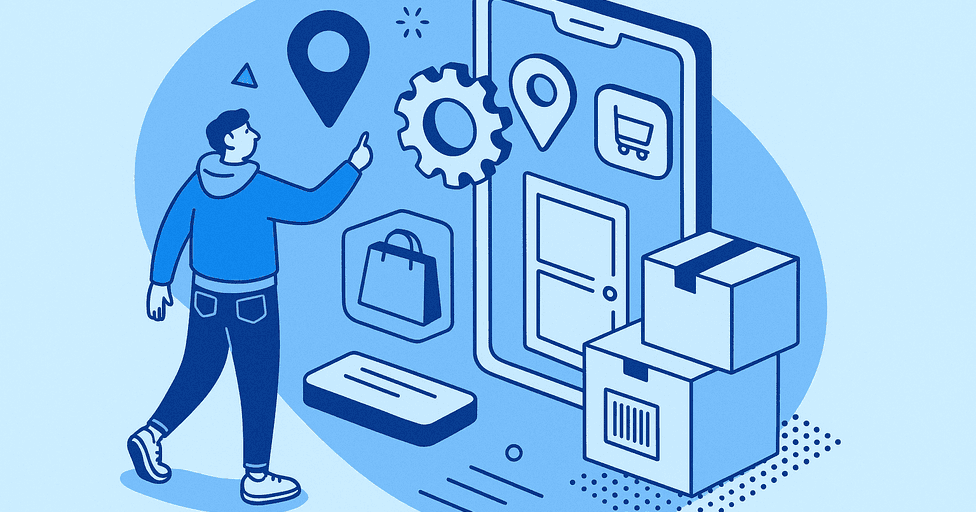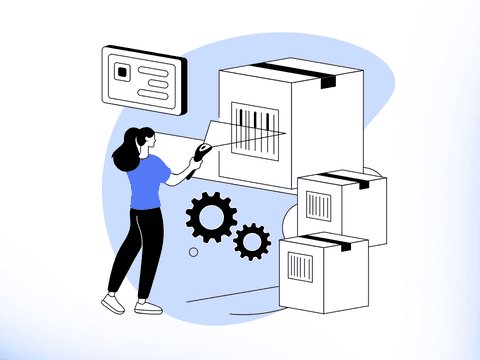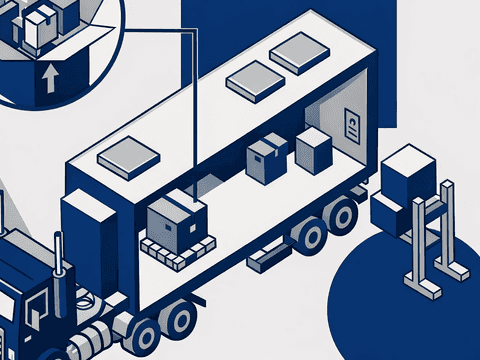Tl,DR
- Self-service means speed: AI-powered tools let customers fix issues, track orders, or request returns without waiting—fast, simple, and available 24/7
- Support costs drop naturally: Fewer tickets and repetitive questions mean smaller teams and less overhead, especially for growing ecommerce brands
- Clarity reduces contact: Smart content, clear actions, and consistent flows help users solve problems without confusion or extra steps
- Outvio is the best self-service solution for ecommerce: one AI-driven platform where customers can manage tracking, returns, exchanges, and more
Customers want answers fast, and they don’t want to wait for an agent.
That’s why self-service tools are now essential. From AI chat to help centers, the right solution lets users solve issues instantly, while your team focuses on what matters.
In this guide, we’ve ranked the best self-service software solutions for 2026. If you’re looking to cut support costs and boost satisfaction, start here.
Top rated digital self-service customer support solutions
| Tool | G2 Rating | Best For | Pricing |
|---|---|---|---|
| Outvio | ★★★★☆ 4.8 | eCommerce brands that want full post-purchase control | Custom pricing. Includes unlimited agents, automations, API, exchanges, warehouses. |
| Zendesk | ★★★★☆ 4.3 | Large teams with complex support needs | From $55/agent/month. AI and automation only in higher tiers. |
| Salesforce | ★★★★☆ 4.4 | Brands already using Salesforce for CRM | From $25/user/month. Full features at $100–$330/user/month. |
| HubSpot | ★★★★☆ 4.4 | Companies using HubSpot’s CRM ecosystem | From $50/user/month. Full suite at $150/user/month. |
| Freshdesk | ★★★★☆ 4.4 | Teams wanting a simple omnichannel solution | From $15/agent/month. Enterprise tools at $79/agent/month. |
| Intercom | ★★★★☆ 4.5 | SaaS and digital-first businesses | From $39/user/month. Full features from $99–$139/user/month. |
| Zoho Desk | ★★★★☆ 4.4 | SMBs needing affordable ticketing tools | From $20/user/month. AI tools from $40/user/month. |
| DevRev | ★★★★☆ 4.5 | Product-led SaaS teams | From $19.99/user/month. Pro plan at $59.99 with AI and analytics. |
| Chatwoot | ★★★★☆ 4.5 | Startups needing an open-source help desk | From $19/agent/month. Enterprise plan at $99/agent/month. |
What is an online customer self-service software
Customer self-service software lets users find answers, resolve issues, and manage orders without needing to speak with an agent. It includes tools like help desks, chats, FAQs, return portals, and automated workflows.
Benefits of self-service
In short: more control for your customers, fewer headaches for your team:
- 81% of U.S. consumers try to solve issues on their own before reaching out to a support agent.
- 73% say the most important thing a company can do is value their time—usually by providing self-service tools.
- Companies that implement effective self-service see up to 30% fewer support tickets and 20–25% cost savings on customer service operations.
With a self-service platform, your customers get the answers they need right away—through a chatbot or a help portal. That means fewer tickets for your team, lower costs for your business, and no need to grow the support team just to keep up.
Best self-service solutions to reduce customer support costs
1. Outvio
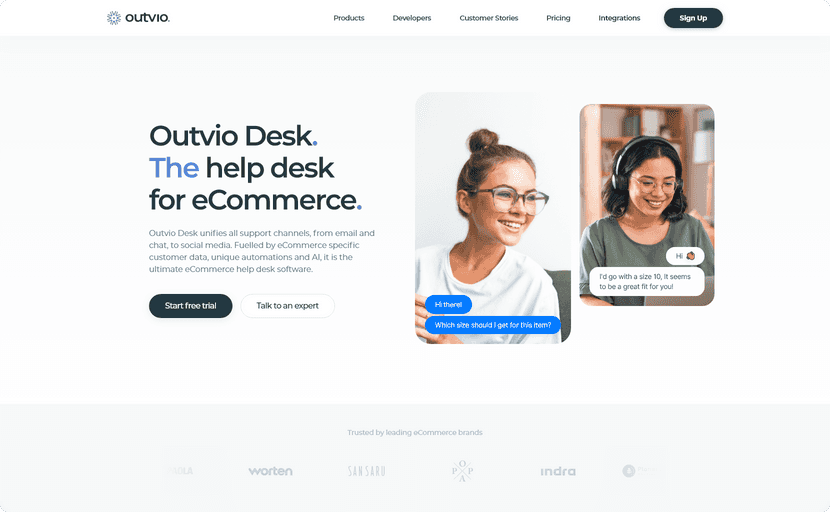
Outvio is the top self-service solution for eCommerce customer support. It combines an AI-powered portal, a built-in chatbot, and a full help desk to cover the entire post-purchase journey.
Customers can track orders, request returns or exchanges, get product recommendations, and resolve issues—without opening a ticket.
Outvio helps eCommerce brands reduce support requests by up to 70%, while offering unlimited agents, tickets, and automations.
G2 Rating
Key features
- AI-powered self-service portal
- Self-service order management and automatic scheduling
- Built-in return and exchange automation
- Integrated tracking with branded notifications
- Product recommendations and feedback collection
- Help desk and ticket management included
- Unlimited tickets, calls, agents, and automations
Paid plans start at $125/month with branded tracking, returns, and notifications. The $250/month tier includes automated exchanges, API access, and unlimited warehouses. Outvio unlimited tickets, calls, agents, and automations—so you can offer top-tier support without worrying about rising costs.
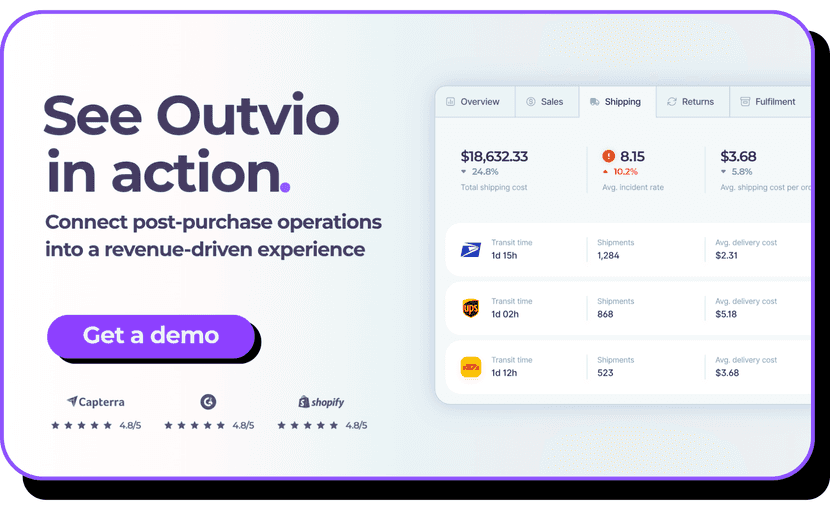
2. Zendesk
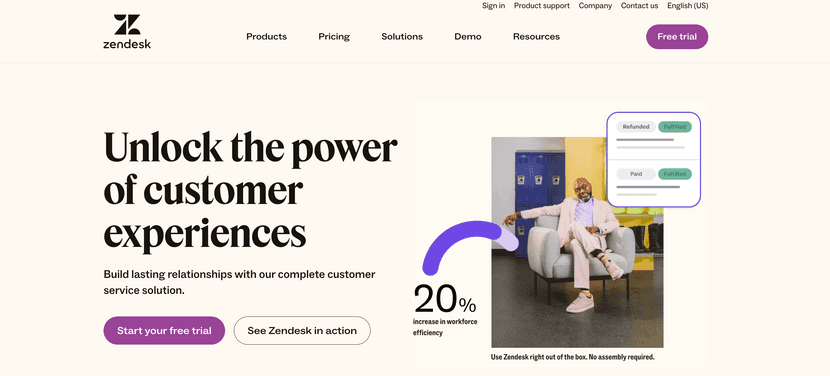
Zendesk offers a full suite of self-service tools including help centers, AI bots, and automated workflows. Its AI Content Cues identify knowledge gaps and generate help articles proactively.
G2 Rating
Key features
- Generative AI for article creation
- Advanced help center and community forums
- Content gap detection
- Flexible APIs for custom portals
Pricing: Starts at $55 per agent/month for foundational features. Advanced AI, reporting, and automation capabilities are available in the Suite Professional and Suite Enterprise tiers.
3. Salesforce Service Cloud
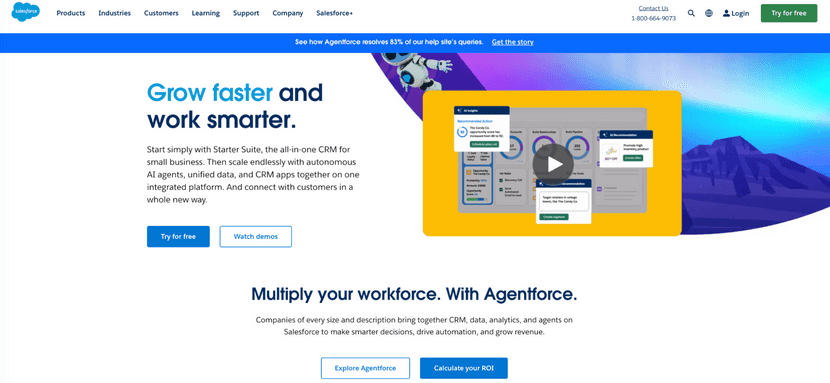
With Salesforce, companies can build self-service portals deeply integrated with sales, marketing, and service data. The system offers case deflection, AI assistance, and analytics to continuously optimize support.
G2 Rating
Key features
- Unified CRM-driven service workflows
- Self-service portals tied to customer data
- AI-driven case routing and insights
Pricing: Starts at $25/user/month for the Starter plan with basic case management. Pro and Enterprise tiers ($100–$330/user/month) include automation, AI tools, and self-service portals.
4. HubSpot Service Hub
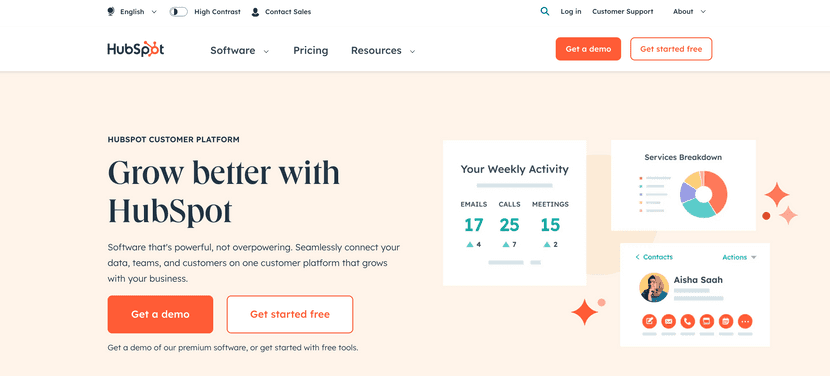
HubSpot’s self-service tools are ideal for businesses using its CRM. It includes knowledge bases, chatbots, ticketing, and automation to keep support efficient and aligned with the broader customer journey.
G2 Rating
Key features
- CRM-linked help desk and chatbot flows
- Knowledge base with SEO optimization
- Multichannel inbox and SLA tracking
Pricing: Paid plans start at $50/user/month for ticketing and automation tools. The Professional plan at $100/user/month adds SLAs, routing, and a knowledge base. Enterprise features like playbooks and custom SLAs come in at $150/user/month
5. Freshdesk
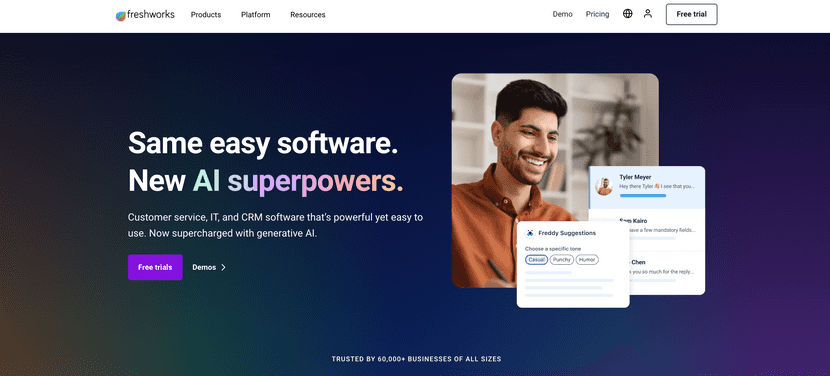
Freshdesk provides an easy-to-use self-service environment with strong ticketing, automation, and AI capabilities. It integrates well with third-party tools and supports omnichannel support.
G2 Rating
Key features
- AI-driven bots and knowledge base
- Canned responses and ticket fields
- 1,000+ integrations
Pricing: Starts at $15/agent/month with basic automation. The Pro plan at $49/agent/month adds advanced ticket routing, SLAs, and analytics. Enterprise plans offer more control with custom roles and bots at $79/agent/month.
6. Intercom
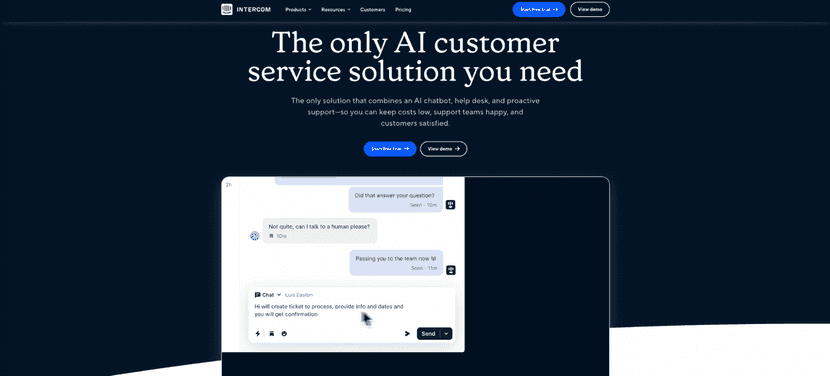
Intercom delivers a proactive, chat-based support experience. Its automated bots guide users through issues using conversational flows and embedded help content.
G2 Rating
Key features
- Conversational bots with trigger flows
- In-product onboarding tours and messages
- Scalable for SaaS and digital products
Pricing: Starts at $39/user/month for essential tools. Advanced and Expert tiers ($99–$139/user/month) add automation, SSO, SLAs, and multibrand support.
7. Zoho Desk
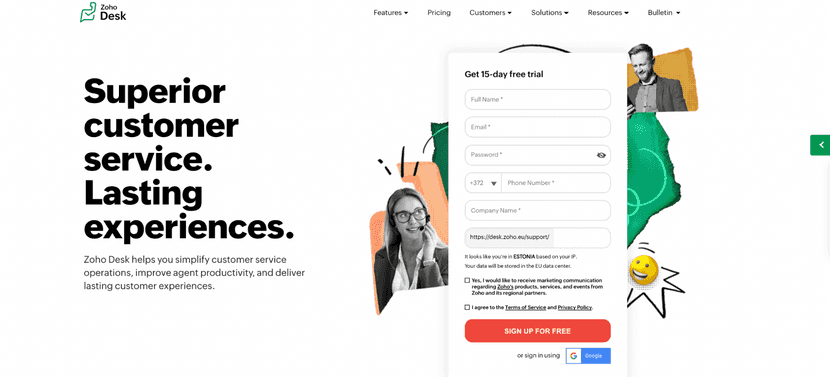
Zoho Desk offers core help desk functions and a customizable help center. It supports ticketing, automation, and multichannel communication at a competitive price point.
G2 Rating
Key features
- Context-aware ticketing
- Help center with role-based access
- Seamless Zoho CRM integration
Pricing: Starts at $20/user/month for the Standard plan with SLAs and workflow rules. Higher tiers ($23–$40/user/month) add advanced process automation, multi-brand support, and AI tools.
8. DevRev
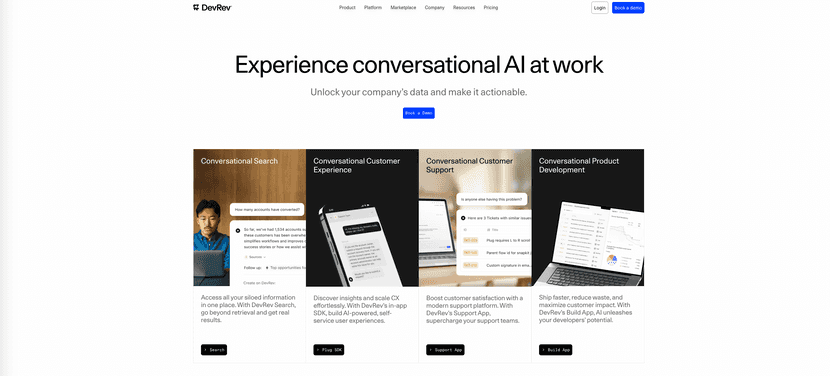
DevRev blends AI, product data, and user intent to build contextual self-service experiences. Its assistant interprets sentiment and drives product-led support with minimal configuration.
G2 Rating
Key features
- Knowledge graph for intent-driven help
- Built-in AI assistant (PLuG)
- Good for SaaS and product teams
Pricing: Starts at $19.99/user/month for the Starter plan with AI agents and basic ticketing. The Pro plan at $59.99/user/month adds advanced reporting and SLA tools. Enterprise features are available with custom pricing.
9. Chatwoot
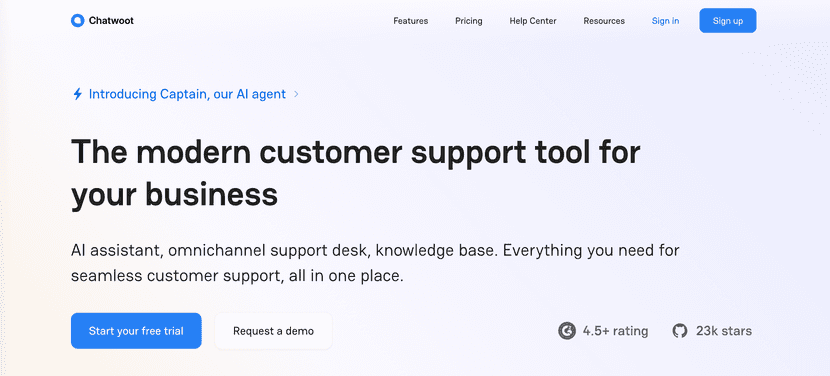
Chatwoot is a developer-friendly platform that allows businesses to fully control infrastructure and branding. Ideal for companies with data security or compliance requirements.
G2 Rating
Key features
- Customizable UI and workflows
- Open-source and hostable on your own servers
- Multichannel support from email to social
- Community and enterprise plans available
Pricing: Paid plans start at $19/agent/month for startups and scale to $99/agent/month for enterprises. Higher tiers unlock automation, SAML SSO, SLAs, audit logs, and dedicated account management.
How to provide a good self service experience: examples and use cases
A good self-service experience should feel intuitive, fast, and reliable.
The goal is to empower users to solve simple problems on their own, without friction. Here are the core principles:
1. Let users help themselves instantly
A customer wants to return a product on a Sunday evening. Instead of waiting for support, they open a branded portal, select the item, choose a reason, and get an instant return label—no waiting, no emails.
This kind of fast, clear, autonomous resolution lowers support volume and leaves customers feeling empowered.
2. Guide users with smart content
Someone searches "how to change my delivery address" in your help center. The system not only shows a step-by-step guide but also highlights related actions like rescheduling the delivery or updating their profile.
3. Prevent Contacts with proactive information
Right after checkout, customers receive an email explaining how to track their order, what to expect next, and how to request changes. This heads off "Where is my order?" contacts before they even begin, building trust through transparency and reducing friction.
4. Use simple language, designed for speed
Imagine a help article titled "Activate Your Account in 2 Steps"—visuals, bullets, quick to scan. Compare that to "Account Configuration Process" buried in paragraphs.
Clear, simple language makes answers easier to absorb, which means fewer contacts and faster resolutions.
5. Keep the experience consistent
A shopper checks their order status, sees a problem, clicks a link, and enters a return flow that looks and feels the same—same tone, same branding, same logic. That consistency reinforces confidence and keeps users in flow without confusion.
6. Learn and adapt based on usage
If 20% of users who search for “delivery options” still contact support, something’s off. Updating the article with clearer steps and embedding FAQs into the checkout process closes that gap. This continuous learning loop is what turns a static help center into a true self-service engine.
Outvio: The best self-service software for eCommerce
Unlike basic help desks or static FAQs, Outvio gives your customers real control: they can track orders in real-time, request returns or exchanges, and even get personalized product suggestions—without waiting for a reply or opening a ticket. Think of it as a 24/7 assistant that knows your store inside out and speaks your customer’s language.
Let’s say someone wants to return a product at 2 AM. Instead of writing an email and waiting days for a reply, they log in to your branded portal, select the item, choose a return or exchange, and get an immediate resolution. That’s what modern eCommerce demands—and that’s what Outvio delivers.
Discover why Outvio is the best self service solution for eCommerce. Book a demo today.

